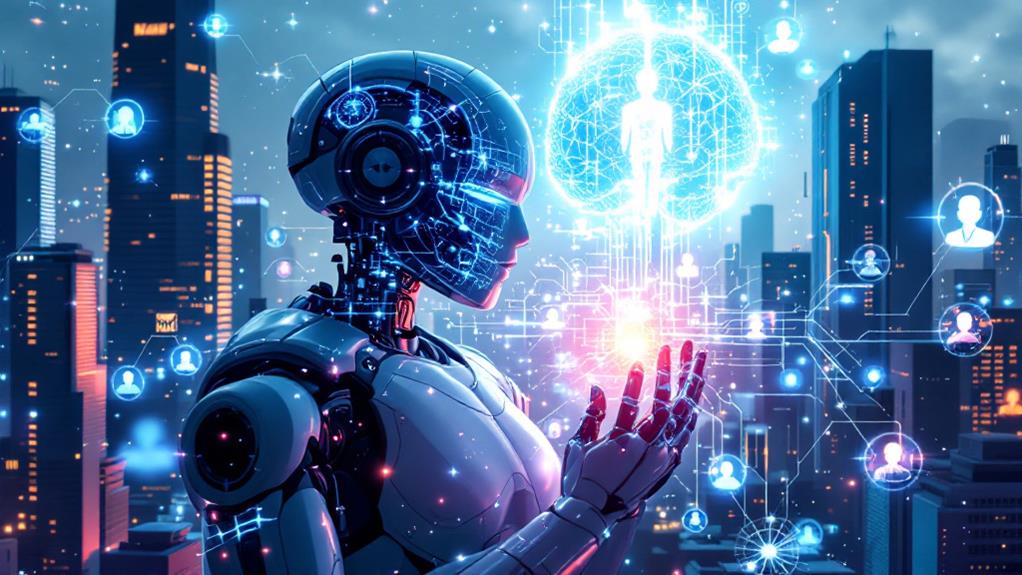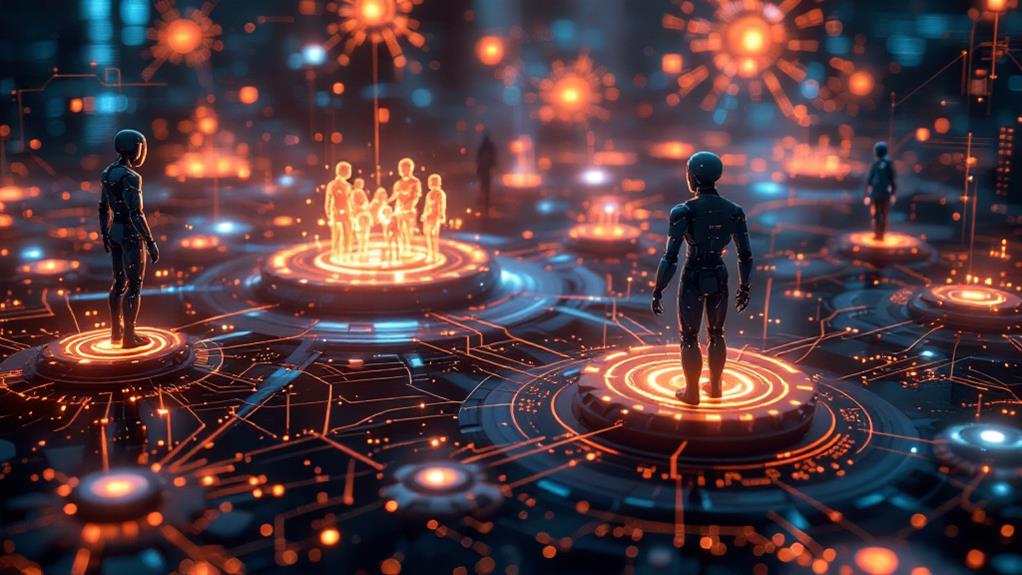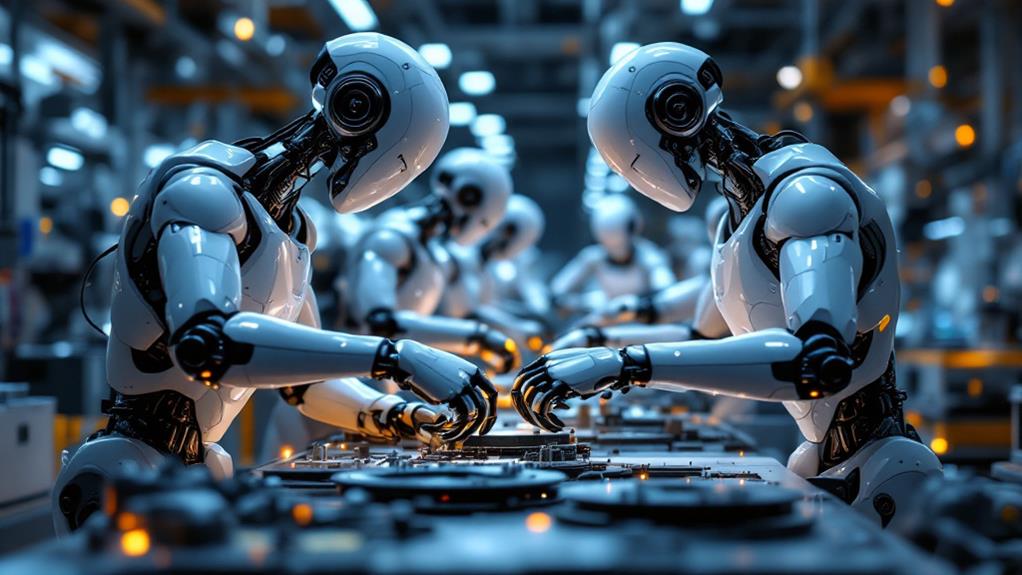What Is the “Singularity” Concept in Artificial Intelligence? A Guide to AI’s Future

You're about to uncover the singularity in artificial intelligence, where AI outpaces human intelligence, creating enormous changes in how we live. The concept emerged from mid-20th century thoughts on machines autonomously improving themselves, inspired by thinkers like John von Neumann. The singularity involves AI learning swiftly through vast data, becoming increasingly intelligent and capable. Visionaries like Ray Kurzweil and Nick Bostrom debate its societal and ethical repercussions, from job displacement to privacy concerns. As AI technologies evolve, understanding their future impact becomes vital to navigate and shape what comes next. Prepare to investigate the possibilities and challenges ahead.
Origins of the Singularity
The concept of the singularity in artificial intelligence has its roots in the mid-20th century when visionary thinkers initially imagined a future where machines could surpass human intelligence. You might trace this idea back to pioneers like John von Neumann and I.J. Good, who speculated about computers' potential to evolve and improve autonomously. In this historical context, the singularity represented a threshold where AI would not just complement human capabilities but exceed them.
As you investigate the philosophical implications, reflect on how these early notions forced people to rethink humanity's place in the world. The singularity raises questions about consciousness, identity, and the very nature of intelligence. Will machines develop a form of consciousness similar to ours, or will they remain fundamentally different? This period saw an explosion of thought on these topics, influencing science fiction and inspiring countless discussions on ethics and societal transformation.
In understanding the origins, you see that it's not just about technology but also a profound shift in how we perceive our future. The singularity challenges you to contemplate both the risks and possibilities as AI continues its rapid advancement.
Defining the Singularity
As you move from the origins of the singularity to its definition, understanding what the singularity truly entails becomes essential. The singularity refers to a hypothetical point in the future where artificial intelligence transcends human intelligence due to advancements in machine learning and computing power. At this stage, AI systems could self-improve at an unprecedented rate, leading to exponential growth in their capabilities. This rapid progression might result in machines surpassing human cognitive abilities, altering the way we live, work, and interact.
In essence, the singularity is characterized by AI's ability to optimize itself without human intervention, achieving levels of intelligence and problem-solving beyond our current comprehension. With machine learning at its core, AI systems learn from vast amounts of data, adapt, and evolve, pushing the boundaries of what they can achieve. The exponential growth that defines the singularity means that improvements in AI could accelerate rapidly, creating a cascade of advancements that were previously unimaginable.
Understanding the singularity's definition helps you grasp the potential implications of AI's future trajectory. It challenges you to reflect on the possibilities and consequences of a world where machines might outpace human intellect, reshaping society in profound ways.
Key Figures and Theories

Pioneers in the field of artificial intelligence have shaped the concept of the singularity with groundbreaking theories and insights. Among the key proponents is Ray Kurzweil, who predicts a future where AI surpasses human intelligence. His theoretical framework, known as the Law of Accelerating Returns, suggests that technological progress is exponential. This means you'll see rapid advancements in AI capabilities, eventually leading to a singularity.
Another influential figure is Vernor Vinge, a science fiction writer and mathematician. Vinge introduced the notion that when machines become smarter than humans, societal changes will occur at an unpredictable pace. His ideas provide a compelling narrative for understanding the potential of AI and highlight the transformative nature of the singularity.
Moreover, Nick Bostrom, a philosopher, has contributed with his theoretical framework surrounding superintelligence. Bostrom's work focuses on the ethical considerations and existential risks associated with AI surpassing human intelligence. His theories urge you to contemplate the implications of AI development and the responsibility that comes with it.
These key proponents and their theoretical frameworks have laid the groundwork for understanding the singularity, offering you a glimpse into the future of AI and the profound changes it may bring.
Potential Impacts on Society
Imagine a world where AI's rapid evolution profoundly reshapes every aspect of daily life. You're maneuvering through economic shifts as traditional industries adapt or vanish, leading to new opportunities but also significant job displacement. As machines take on tasks across sectors, you might find yourself reconsidering career paths and developing new skills to stay relevant.
Societal norms will evolve, too. AI could redefine how you interact with others, changing communication patterns and personal relationships. Education transformation becomes vital, as learning systems integrate AI to personalize your educational experience, preparing you for an unpredictable future. These shifts demand that you adapt your approach to both teaching and learning.
Power dynamics might also see a shift, as entities controlling advanced AI systems gain unprecedented influence. You'll need to be mindful of who holds the power and how it affects your life. Privacy concerns will be at the forefront, as AI systems collect and analyze vast amounts of personal data, potentially infringing on your privacy. It's imperative to advocate for robust regulations and ethical standards to protect your information and rights. The singularity's potential impacts on society will require vigilance and adaptability from you.
Technological Advancements Needed

To reach the singularity, driving significant technological advancements is vital. You'll need to push the boundaries of what's possible with traditional computing. Quantum computing offers a promising avenue, as it can process complex calculations at unprecedented speeds. This capability is fundamental for developing the sophisticated algorithms required for AI to surpass human intelligence. By harnessing quantum computing, you can tackle problems that classical computers would take years to solve.
Another significant area of advancement is neural networks. These are the backbone of machine learning and AI development. You'll need to improve their complexity and learning efficiency. Enhancing neural networks involves creating deeper and more nuanced architectures that can mimic the human brain more closely. This will allow AI to perform tasks that require reasoning, creativity, and emotional understanding.
You should also focus on integrating these technologies seamlessly. Quantum computing and advanced neural networks need to work in harmony to reveal their full potential. By doing so, you'll pave the way for AI systems capable of self-improvement and adaptation, which are key characteristics of singularity-level intelligence. Prioritizing these advancements will bring you one step closer to realizing AI's transformative power.
Ethical Considerations
As you push the boundaries of technology with quantum computing and advanced neural networks, it's critical to contemplate the ethical implications that accompany these advancements. AI ethics demand that you consider the moral implications of your creations. It's not just about building smarter machines; it's about guaranteeing that these machines operate within an accountability framework that respects societal responsibility. With great power comes the need for risk management that addresses fairness considerations and transparency issues.
When you're designing AI systems, human oversight is fundamental to prevent unintended consequences. You must guarantee that AI decisions are explainable and transparent, so users understand how outcomes are reached. Fairness considerations mean avoiding bias in data and algorithms, guaranteeing equitable outcomes for all societal groups. Your responsibility extends to safeguarding privacy and maintaining the security of personal data.
It's essential to establish accountability frameworks that define who is responsible when things go wrong. This means setting clear guidelines for developers, operators, and users, so everyone knows their role in maintaining ethical AI behavior. Ultimately, embracing these ethical considerations guarantees that your AI advancements contribute positively to society and reflect shared moral values.
Criticisms and Controversies

Critics of the singularity concept in artificial intelligence often raise several significant concerns. One of the primary issues is public perception, heavily influenced by media portrayal. Movies and TV shows frequently depict AI dystopias, where machines surpass human control, creating unnecessary fear and misunderstanding. Such portrayals can skew public perception, making it difficult to have rational discussions about AI's real potential and limitations.
Philosophical implications also add to the controversy. The idea of machines achieving consciousness raises questions about what it means to be human. Are we ready to redefine intelligence or consciousness? These questions aren't just theoretical; they touch on our very identity and existence, sparking heated debates.
Economic ramifications are another essential concern. As AI grows more sophisticated, there are fears about job displacement and widening economic inequality. Are societies prepared for such drastic changes? Many argue we lack societal readiness to handle these challenges effectively.
Ultimately, while the singularity concept fascinates many, it's surrounded by criticisms and controversies that demand careful consideration. You must weigh the potential benefits against the risks, considering both the philosophical and practical implications of a world where AI might one day surpass human intelligence.
Future Predictions and Scenarios
When imagining the future of artificial intelligence, it is imperative to investigate both optimistic and cautious scenarios. You might envision a world where exponential growth in AI capabilities leads to superintelligent systems that revolutionize every aspect of life. In this positive outlook, human AI collaboration fosters transformative technologies, improving cognitive abilities and solving complex global issues. The synergy between humans and AI could drive societal adaptation, making life more efficient and productive.
However, it's important to take into account the cautious side, where unforeseen challenges could arise. With the rapid development of AI, algorithmic governance becomes crucial to guarantee these systems align with human values and ethics. The introduction of superintelligent systems might disrupt job markets, requiring significant societal adaptation to new roles and industries.
Moreover, cognitive improvement through AI could lead to disparities, creating divides between those with access to advanced technologies and those without. Balancing these advancements with ethical considerations will be key to a harmonious future. While the potential for AI is vast, careful planning and regulation will be necessary to navigate the complexities and guarantee that AI's growth remains a force for good in society.



